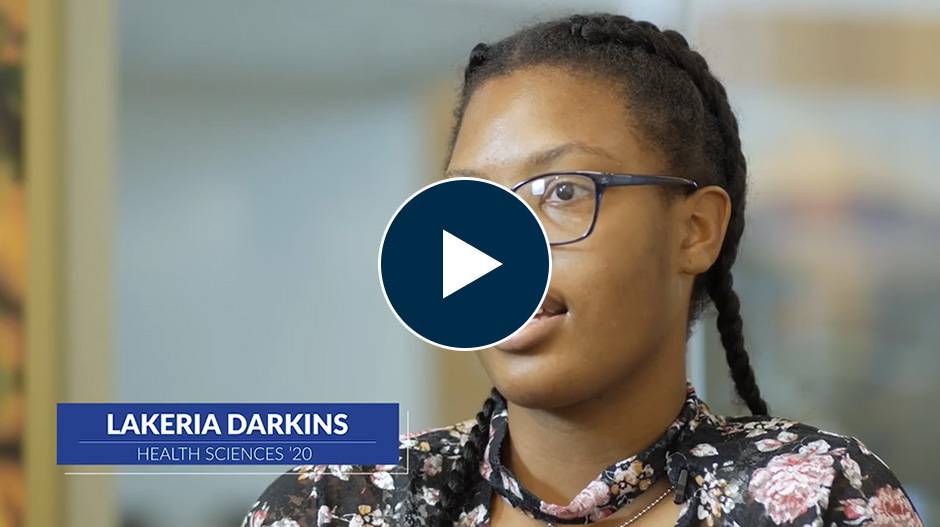The Biology program curriculum explores the field of biology from the molecular and cellular level to the level of populations and ecosystems.

The Department of Biology offers a four-year program leading to a Bachelor of Science in biology. The curriculum promotes an understanding of biology from molecules and cells to organisms, populations and ecosystems. Advanced courses allow students to explore a variety of areas of interest. The mission and objectives for the Biology major can be found here. Courses are small (typically no more than 32 students in a lecture section, 16 students in a lab section) and are taught by engaged, enthusiastic faculty members.
The Biology major provides a strong education in cell biology, organismal biology and scientific inquiry, with coursework in biology, chemistry, physics and mathematics. The department offers courses in foundational disciplines and in a variety of specialty fields. An introductory seminar provides exposure to various careers, opportunities and learning skills in biology and health fields. Students gain experience in finding and reading biological literature (published research studies) in an upper-level seminar, and scientific experimentation and communication are emphasized throughout the curriculum. Students majoring in Biology can, with one additional course, earn a minor in Chemistry.
Students interact through their coursework and through activities such as those sponsored by the Biology Club.
Effective Fall 2017, students pursuing the B.S. in Biology at MCLA will enroll in the general Biology major or a Biology major with a concentration (a sequence of coursework targeted to a specific field) in Pre-Medical Professions, Pre-Veterinary, or Biotechnology. For concentrations in Pre-Physician Assistant, Pre-Physical Therapy, Pre-Occupational Therapy, Medical Technology and Sport Medicine, see the Health Sciences major offered by the Biology Department. The department also offers majors in Community Health Education and in Athletic Training.
The general Biology major provides a broad education in biology, from molecules to organisms to ecological relationships. Students in this major have pursued advanced degrees and careers in wildlife biology, conservation biology and plant biology, among others.
Students interested in secondary education can complete requirements for the general biology major and teaching licensure to gain certification to teach in the state of Massachusetts, and can complete a 4+1 program to earn a B.S. in Biology and Masters of Education in five years.
The Pre-Medical Professions concentration serves students interested in medicine, dentistry and pharmacy. Upper-level courses such as Microbiology, Anatomy & Physiology I and II and Cell & Molecular Biology provide advanced content and skill training.
The Pre-Veterinary concentration aligns with the pre-requisite courses for veterinary programs. Coursework includes Animal Behavior and Animal Physiology, and animal care internships are hosted both on- and off-campus.
The Biotechnology concentration provides a solid background in both biology and chemistry. This concentration places an emphasis on laboratory coursework and prepares students for a variety of careers in biotechnology.
*Current students: to see how the 2017 curricular changes affect you, see the departmental Canvas page.
To earn a minor in Biology, a student must complete BIOL 150 Introduction to Biology I: Cells, BIOL 160 Introduction to Biology II: Organisms, BIOL 240 Genetics, and 9 elective credits in biology, with at least three of the elective credits being upper-level (300-level or higher).
Students are strongly encouraged to observe professionals in their fields of interest and to participate in independent research, internships and/or other experiences that emphasize independent work and demonstration of professional skills. Students can start working with faculty on research projects as early as their first year at MCLA, and many present their findings at local and regional research conferences. A number of local institutions regularly host MCLA interns, and other internships can be established based on a student’s area of interest.
Graduates of MCLA are currently enrolled in a variety of programs of advanced study, including medicine, veterinary medicine, pharmacy, plant biology, biotechnology and education. Others are employed in research labs, medical facilities, high schools, governmental agencies and other settings.
First, finish your undergrad at MCLA. Then apply to veterinary programs, which tend to be extremely selective. Don’t get down on yourself when you don’t get in the first time; apply again next year. But that’s just the beginning of this story. Read More...